The Kaiser Permanente behavioral health center in Arvada is a leading resource for mental wellness, offering personalized coaching programs that target emotional regulation and social skills, often overlooked in traditional healthcare. They empower individuals to cope with stress, enhance resilience, and improve overall well-being through evidence-based practices and cultural sensitivity. Their initiatives, like the Mental Wellness Podcast Series and Cultural Competency Training, promote awareness and understanding. Effective coaching models and strategic planning, combined with digital platforms and data-driven approaches, ensure their programs remain impactful and accessible to a diverse community.
Mental wellness coaching programs are gaining prominence as integral components of holistic healthcare, especially with organizations like Kaiser Permanente Behavioral Health Center, Arvada, leading the way. This article explores the development and implementation of such programs, focusing on understanding the rising need for mental wellness support in the workplace. We’ll delve into designing effective coaching models, successful rollout strategies, and measuring impact, drawing insights from the innovative practices at Kaiser Permanente.
- Understanding the Need for Mental Wellness Coaching Programs
- The Role of Kaiser Permanente Behavioral Health Center, Arvada
- Designing Effective Coaching Models and Curricula
- Implementation Strategies for Successful Program Rollout
- Measuring Impact and Continuous Improvement in Mental Wellness Coaching
Understanding the Need for Mental Wellness Coaching Programs

In today’s fast-paced world, mental wellness is just as crucial as physical health, especially in bustling communities like Arvada where stress and anxiety can run high. Organizations such as the Kaiser Permanente behavioral health center play a vital role in promoting Mental Health Awareness by offering coaching programs that cater to various aspects of well-being. These initiatives recognize that emotional regulation and social skills training are essential components of overall health, particularly for folks navigating life’s challenges.
The need for such programs is evident, given the increasing prevalence of mental health issues among all age groups. By providing personalized coaching, these centers empower individuals to develop coping strategies, enhance their resilience, and improve their quality of life. This proactive approach to mental wellness can serve as a game-changer, transforming lives and fostering healthier communities, much like a vibrant symphony that resonates through the heart of Arvada.
The Role of Kaiser Permanente Behavioral Health Center, Arvada

The Kaiser Permanente Behavioral Health Center in Arvada plays a pivotal role in promoting mental wellness within the community. As a leading healthcare provider, they offer comprehensive services tailored to address various aspects of psychological well-being. Their expertise lies in integrating evidence-based practices with a strong emphasis on cultural sensitivity and competency. This approach ensures that individuals from diverse backgrounds receive care that respects their unique needs and experiences.
The center’s initiatives include the production of a Mental Wellness Podcast Series, which aims to educate and engage listeners on various mental health topics. Additionally, they provide Cultural Competency Training for healthcare professionals, fostering an environment where practitioners can enhance their skills in delivering culturally sensitive services. These efforts reflect the center’s commitment to not only treating mental health conditions but also promoting awareness and understanding within the Arvada community and beyond.
Designing Effective Coaching Models and Curricula

Designing Effective Coaching Models and Curricula is a critical aspect of developing mental wellness coaching programs, particularly for centers like the Kaiser Permanente behavioral health center in Arvada. These models should be evidence-based, incorporating strategies that have shown success in improving emotional regulation and fostering resilience. One effective approach is to integrate Crisis Intervention Guidance, which equips coaches with skills to support individuals during times of distress.
The curricula should also prioritize Compassion Cultivation Practices, teaching participants how to cultivate empathy, self-awareness, and a non-judgmental mindset. By combining these techniques with tailored coaching models, programs can offer comprehensive support that addresses the unique needs of each individual. This personalized approach ensures that clients not only gain coping mechanisms for current challenges but also develop long-lasting strategies for maintaining mental wellness.
Implementation Strategies for Successful Program Rollout

Implementing a mental wellness coaching program requires careful planning and strategic approaches to ensure its success. One notable example is the integration of these initiatives within established healthcare structures, such as the Kaiser Permanente behavioral health center in Arvada. By aligning with existing resources, organizations can benefit from proven systems and dedicated teams, fostering a smoother transition and potentially higher participant engagement.
Cultural sensitivity in mental healthcare practice plays a pivotal role in program effectiveness. Tailoring coaching methods to accommodate diverse cultural backgrounds ensures inclusivity and enhances the accessibility of mental wellness support. Moreover, leveraging digital platforms and producing engaging Mental Wellness Podcast Series can extend the reach of these programs, making them more accessible and appealing to a broader audience.
Measuring Impact and Continuous Improvement in Mental Wellness Coaching

Measuring the impact and effectiveness of mental wellness coaching programs is a vital aspect of continuous improvement. At the Kaiser Permanente behavioral health center in Arvada, for instance, coaches employ various methods to assess progress. This includes pre-and post-program evaluations, where clients reflect on their mental health status, personal growth, and goal achievements using standardized questionnaires. By comparing these results, coaches can identify successful components and areas needing enhancement.
Additionally, regular check-ins and ongoing feedback sessions allow for dynamic adjustments. Coaches encourage clients to maintain Mental Wellness Journaling Exercise Guidance, documenting their emotions, thoughts, and strategies used during coaching. This practice facilitates self-reflection and provides valuable insights for both the coach and client. Moreover, assessing Emotional Intelligence levels before and after the program can measure the impact on interpersonal skills and emotional awareness—crucial aspects of mental wellness. Such data-driven approaches enable the development team to refine Mental Wellness Coaching Programs Development, ensuring they remain effective and aligned with clients’ evolving needs.
Mental wellness coaching programs, as exemplified by the innovative work at the Kaiser Permanente Behavioral Health Center in Arvada, are crucial tools for enhancing mental health support. By designing effective curricula and implementing strategic rollout plans, these programs can significantly impact individual well-being and community resilience. Continuous improvement, through measured outcomes and adaptive practices, ensures that mental wellness coaching remains a dynamic and impactful resource in today’s challenging times. The success of such initiatives underscores the importance of investing in mental health coaching as a game-changer in fostering healthier individuals and communities.






